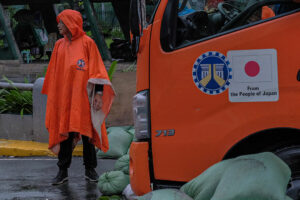The Empire Strikes Back.
THE GOLDILOCKS ZONE: that distance from a sun that enables conditions in surrounding planets for liquid water to exist, hence, making them habitable, in theory — a rare sighting among astronomers.
Not an exact metaphor here, but it’s still kinda like the elusive condition under which our economy could thrive that we seek in our ties with China, the world’s second-biggest economy. Economists expect that giant to displace the United States as the biggest economy, current internal challenges notwithstanding. Hence, there is no way any country can decouple from it, though it would be wise to cut our reliance on China by diversifying trade and other aspects of the economy towards other opportunities.
Some folks, including China’s Foreign Minister Wang Yi, cite our Southeast Asian peers as examples of independent foreign policy for us to emulate (true of Vietnam, which has had its own tiff with China, but an unfair comparison with others that have not faced the aggression that we now do).
I recall fellow columnist, Stratbase CEO/Managing Director Victor Andres C. Manhit, saying in a briefing that he had told off with “I don’t care” a Southeast Asian academic who remarked that the Philippines was too identified with the US. Beijing has only itself to blame in this matter since it forced us to a corner. Sun Tzu would have given Beijing a failing mark, since it could otherwise have achieved its strategic objectives with us in more persuasive, non-confrontational ways.
It behooves each state to balance competing national interests at any given time.
Take Thailand, for example, which has been vying with Indonesia, Vietnam, and Malaysia for more trade, foreign direct investments, and tourists from China (which is the top source across these accounts for Thailand), and relies besides on that northern neighbor for weapons like tanks, air defense systems, warships, and submarines.
On the flip side, Thailand deported at least 40 Uighur refugees — who had been held for a decade in a Bangkok detention center — back to the human rights blackhole that is China’s predominantly Muslim Xinjiang region, saying that “China gave assurance that the Uighurs sent back to Xinjiang would be looked after.”1 Does anyone doubt that that was tantamount to a death sentence for those folks? Bangkok had also faced pressure from Beijing to drop a draft bill that would establish a casino-centered integrated entertainment complex.2
So, “independent foreign policy” is a moving target for each country in Southeast Asia that requires tradeoffs deemed acceptable amid circumstances at a given time.
EMBARRASSINGLet’s now turn our attention to the latest developments in our own backyard.
The Philippine Coast Guard (PCG) commander who deftly steered BRP Suluan out of the anvil towards which two much-larger Chinese ships were driving it on Aug. 11 showed us that we’ve got world-class skippers and crews in terms of seamanship and courage. One western analyst commented that long-running pressure from China has honed the consistently vastly outnumbered PCG into one of the best coast guards in the world (kind of in the same way that nearly a decade of conflict with Russia, punctuated by an invasion that is now on its fourth year, has steeled Ukraine’s troops into the most experienced army in Europe, and one of the best in the world — so I am glad that we are developing defense cooperation with Ukraine).3
Based on their comportment so far, I doubt if Chinese forces would have matched BRP Suluan’s offer of assistance on the spot to injured Chinese counterparts if the shoe were on the other foot. I know that that was universal coast guard SOP, but, given the circumstances, that was one class act.
It will be wise for us to exchange notes with other coast guards that have found themselves bearing the brunt of Beijing’s bully tactics, even though we are sure to have lots to teach them.
Now, of course, in the la la land that Beijing has been painting in its propaganda — foisted internationally but meant more for its truth-starved population who have long been denied access to the global internet and free speech — the smaller ship in the chase is the “troublemaker” and the Philippines is not capable of thinking on its own without the US4… talk about “Cold War mentality” which Beijing has been wont to blame on anyone questioning its hegemonistic designs without first taking a good look in the mirror.
Remember when China’s social media after the June 2024 confrontation — in which China Coast Guard (CCG) sailors, some wielding bladed weapons like stereotypical pirates, ganged up on a handful of Philippine counterparts, wounded a Filipino sailor, and stole their guns — had a field day deriding the latter’ capabilities and calling them names (ignoring the fact that the Filipinos were ordered not to do anything that could worsen the situation, and that they were, as usual, vastly outnumbered)?
Well, Beijing has been curiously silent to this day on the embarrassing Aug. 11 collision of their own ships that purportedly cost lives (reported in Taiwan — the best source of information on the mainland, bar none, not even the US).
Another western commentator likened BRP Suluan’s skipper to Hans Solo, the intrepid space smuggler-rebel commander who always eluded giant imperial “star destroyers” in Star Wars (in fact, one scene in The Empire Strikes Back shows two such “star destroyers” nearly colliding in their rush to corner Solo’s tiny ship, the Millennium Falcon.)
Of course, the BRP Suluan — one of 10 ships of the Parola class in the PCG’s inventory — was made by Yokohama-based Japan Marine United Corp. That (besides the superior seamanship by our Filipino Hans Solo) may partly account for the outcome of the Aug. 11 chase, if we were to believe accounts of shoddy workmanship found by foreign buyers of Chinese-made warships (Pakistan’s air victory using China-made jets in its recent skirmish with India is another matter since that was blamed partly on the latter’s overconfidence, miscalculation, and wrong tactics, as much as the quality of Chinese weaponry).
FOREWARNEDNow, here come Taiwan-based China hands warning us to brace for Beijing’s fury, as it reels from its Aug. 11 drubbing at what it regards as its vassal state and tries to “claw back” whatever it can from its massive loss of face (by the way: note how the Middle Kingdom’s delegates in international fora seem speechless whenever faced with counterarguments from other delegates, giving the impression that they are not used to Beijing being questioned in spontaneous public proceedings they do not control).5
So our coast guard and our navy — in the background in order to avoid taking Beijing’s bait for us to engage its minions in armed confrontation — have their work cut out for them. Strategic affairs analyst Prof. Renato C. de Castro of the De La Salle University and Stratbase noted on Tuesday that a badly hurting Beijing seems to have ordered the CCG to block our ships from leaving our 12 nautical mile territorial waters to the west, while National Maritime Council Spokesman Undersecretary Alexander S. Lopez (a retired vice-admiral) said in an Aug. 18 news conference that “contingency measures… are in place… for the worst scenario.”6
At this point, let me just say that I wish our President had not told Indian news site Firstpost on Aug. 8 that “[t]here is no way the Philippines can stay out of… a confrontation over Taiwan between China and the US,” even as he emphasized that “[w]e are not girding… for war… are just reacting to challenges we are facing…” and “want to… cool down the rhetoric…” in a quest to remain “an enemy to none and a friend to all.”7 That may be true, but it would be best to avoid any risk of misinterpretation — deliberate or otherwise — by Beijing, which has been painting the Philippines as a mindless US pawn in Asia that choreographed the Aug. 11 West Philippine Sea (WPS) incident with Washington.
Still, it’s wise to continue drawing all countries with a stake in unhindered South China Sea transit — the latest being India (which can also help us diversify trade and investments, though still not displacing China) — to collective efforts to keep it free. This partly enforces our July 2016 legal victory at The Hague (our contribution to international rule of law that is now being cited by various countries, not just the US and Vietnam).
There are quarters that argue that it would be better to limit our countermeasures to bilateral talks with Beijing, and to temper our armed forces modernization (which is just to catch up with our neighbors), even if the latter has shown that it does not respect diplomacy that is not backed by credible armed deterrence (just recall how it treated the past administration, whose bending over backwards to cater to Beijing’s sensitivities ended up short-changed and largely unrequited).
In the meantime, the envoys of both countries — Philippine Ambassador to China Jaime A. FlorCruz, a former CNN Beijing bureau chief who had studied and lived there since the onset of Martial Law in the early 1970s, and Chinese Ambassador Huang Xilian — have been working overtime to ensure that at least people-to-people and cultural exchanges, an anchor amid current difficulties, persevere.
Our embassy there and our business sector also soldier on in probing for economic opportunities, i.e., by participating in trade, investment, and tour fairs in China. Of late, our embassy there reported that a delegation led by our Tourism department participated in the Aug. 8 Diving Resort and Travel Show Expo at the China National Convention Center in Beijing.8
It’s just unfortunate that only one or two national dailies reported our participation in that expo, in a brief article buried deep in an inside page at that. Escalating WPS tensions have always hogged the headlines, compared to efforts — heroic at times — to push mutually beneficial exchanges in other arenas of bilateral relations.
We clearly need to bring to the fore all efforts to maximize other areas of our ties with China. Business leaders have already cautioned against the way WPS tensions seem to taint all aspects of our ties with China, and every now and then, one gets to hear some of them let loose their frustrations in private conversations.
Picking professionals in the persons of Foreign Affairs Secretary Maria Theresa P. Lazaro, who has faced senior Chinese counterparts in regular bilateral consultations (a mechanism set up in May 2017), and China hand Mr. FlorCruz, to deal with our northern neighbor was a good move. Secretary Frederick D. Go, former Gokongwei Group top exec-turned-Special Assistant to the President for Investment and Economic Affairs, also has his job here cut out for him.
It’s time for the government to regularly consult with the business sector on the next steps in our dealings with China, since businessmen have useful intelligence and unique insights to offer foreign and trade policymakers. Among others, there is a clear need to present a more holistic view of our bilateral ties with China to the public, and to give our businessmen a clearer picture of opportunities despite current challenges (the name of the game being maximizing whatever openings are available). If the government were to drag its feet here, then business groups can take the lead.
I also think that the government should help those heavily exposed to China to diversify markets. The pandemic impressed that imperative on us, and I hope we have not forgotten that lesson.
Going further, there is a need to help businesses plan for massive disruptions should China invade Taiwan before this decade ends, as many analysts expect (even as US President Donald Trump said that Chinese President Xi Jinping assured him that China won’t attack Taiwan, which it regards as a renegade province, within Mr. Trump’s term9 — whoa, what’s that… till the next US elections in November 2028? Note that the People’s Liberation Army marks its centennial in 2027, while October 2029 will mark the 80th anniversary of the People’s Republic of China.)
Hoping for the best but planning for the worst is a useful dictum here, requiring better-concerted planning across sectors led by the government, or by business chambers.
Before that northern empire strikes back, big time.
Notes:
1 https://tinyurl.com/23738dj7
2 https://tinyurl.com/24k4njhg
3 https://tinyurl.com/25bb4fts
4 https://tinyurl.com/274z68yr
5 https://tinyurl.com/224rsnpq
6 https://tinyurl.com/2by6rhmj
7 https://tinyurl.com/25jlxdtg
8 https://tinyurl.com/2xnqmef3
9 https://tinyurl.com/29lxypkr
Wilfredo G. Reyes was editor-in-chief of BusinessWorld from 2020 through 2023.





